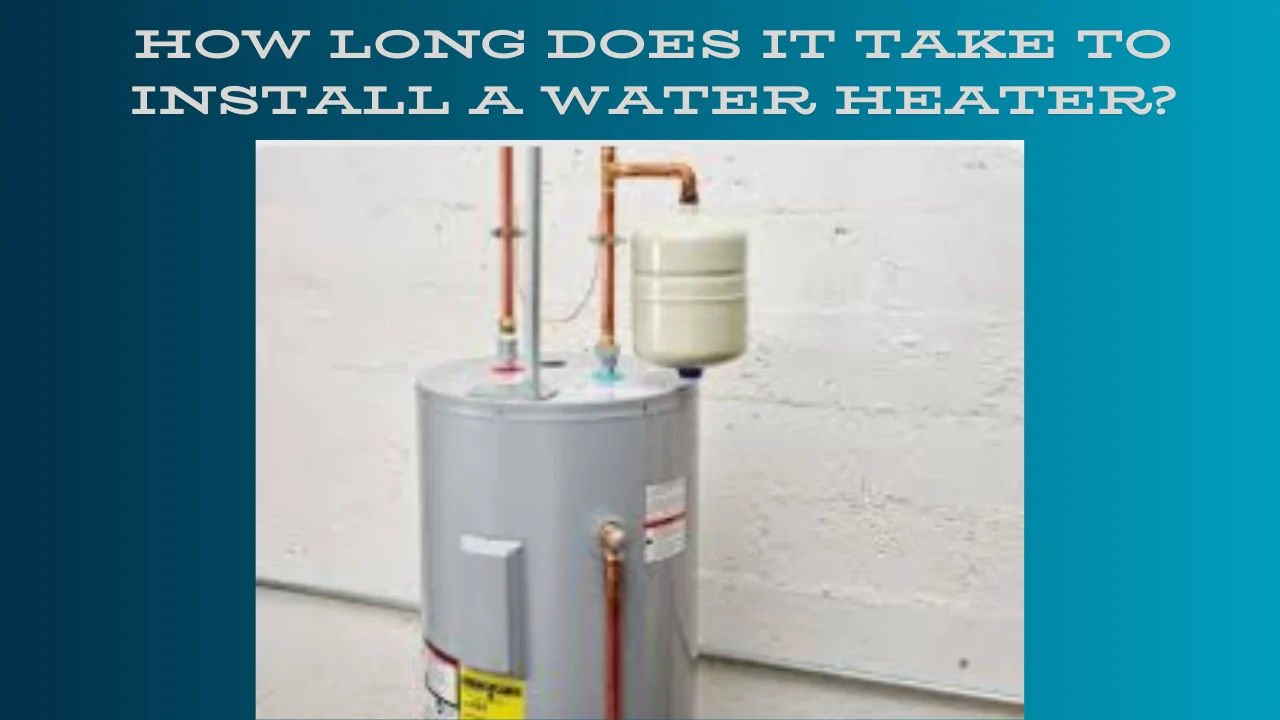Introduction
The availability of hot water for various household uses (washing, cooking, etc.) depends on the installation of a water heater. Even though it’s easy for experts to do, there are a number of steps that must be followed to the letter to guarantee efficiency and safety. A lot of factors, including the water heater’s type, the amount of prep work needed, and whether it’s a new or replacement installation, can affect how long the process takes. One crucial consideration is “How long does it take to install a water heater?”
Key Factors Affecting Installation Time
How long it takes to install a water heater depends on a number of important factors. The work can become more complicated with each addition, necessitating additional time and expert-level understanding.
Type of Water Heater
How long it takes to install a water heater is heavily dependent on its model. The installation time for tankless water heaters, for instance, is typically longer than that of conventional tank water heaters because of the modifications that are typically necessary to the plumbing and electrical systems.
Preparation and Accessibility
The time needed to install the water heater is affected by the condition of the area. Installation can go more quickly if the area is prepared and easily accessible. This involves making sure the installation site is secure and complies with local regulations, as well as removing any outdated systems and verifying compatibility with current connections.
Experience of the Installer
Because of their training and experience, professional installers are usually able to complete the job more quickly when it comes to water heaters. Do-it-yourself installations can be risky and time consuming if the installer doesn’t know what they’re doing.
Compliance and Permits
It is not uncommon for water heater installations to be preceded or followed by inspections and permits mandated by local building codes. Particularly in areas with strict regulations, the time it takes to acquire these permits and arrange inspections can significantly lengthen the overall process.
Upgrades and Modifications Needed
Depending on the size and type of the new water heater, adjustments might be required. All of these factors, such as increasing the available space, modernising the electrical systems, or improving the ventilation, can lengthen and complicate the installation process.
Steps for Water Heater Installation
In order to guarantee the system’s safe and efficient operation, the installation process comprises numerous intricate steps. In order to be ready for a professional installation or a do-it-yourself project, homeowners should familiarise themselves with these steps.
Initial Preparation and Safety Checks
It is essential to conduct safety checks and get the area ready before the actual installation starts. Make sure the area is safe to install the new water heater in before you turn off the gas, water and electricity to the old one.
Removal of the Old Water Heater
Carefully disconnect and remove the old water heater before installing the new one. Careful handling is required at this stage to prevent damage to preexisting plumbing and electrical setups.
Installation of the New Water Heater
After the new heater is set up, all of the necessary connections are made, such as those for water, gas or electricity, according to the model. To avoid leaks or other problems, this step needs to be executed precisely.
Testing and Quality Assurance
It is standard practice to test the system after installation to guarantee proper functionality. This involves making sure the unit satisfies all efficiency and safety standards set by the local code, as well as checking for leaks and testing the temperature settings.
Installation and Cleanup
Cleaning up the installation site, giving the homeowner operating and maintenance instructions, and maybe scheduling a follow-up visit to make sure everything is working properly are the last steps after testing is finished and the unit is running smoothly.
Right Water Heater for Your Needs
Assessing Water Heater Types
If you want your water heater to work as efficiently as possible, you need to choose the right one. Time spent installing, money spent on energy over time, and square footage needed are all factors to consider when selecting a water heater—tankless, electric, gas, or solar.
Tankless Water Heaters
Without a storage tank, tankless water heaters (sometimes called on-demand water heaters) heat water on demand. Although these units are small and efficient, they do require a lot of work to install at first, and you may need to make changes to your home’s gas or electrical systems.
Electric Water Heaters
Electric water heaters are more common than gas ones because they are easier to install and cost less money initially. In most cases, all that’s needed to install them is an electrical connection and water lines. But compared to petrol models, they might end up costing more in the long run.
Gas Water Heaters
In certain areas, gas water heaters can actually save money on utility bills compared to electric ones. Venting and gas line connections are common, making the installation process more complicated and potentially time-consuming compared to electric models.
Solar Water Heaters
As they use solar panels to heat water, solar water heaters are the most eco-friendly choice. Most work goes into installation, which may necessitate alterations to the building’s framework to accommodate solar panels and extra pipes. The initial investment may be more, but you may save a lot of money on your energy bills in the long run.
Installation Considerations and Challenges
Handling Installation Challenges
Installing a water heater is not without its share of potential difficulties. A trouble-free installation is possible if you are aware of and ready for these obstacles.
Space Constraints
Modifications to the structure may be necessary to install larger units or transition from a tank to a tankless system in homes with limited space. To make sure the new system fits and works well, precise measurements and planning are needed.
Upgrading Infrastructure
To install a new water heater, especially one that converts gas to electric or vice versa, older homes may require plumbing or electrical system upgrades. The overall installation time and expense can be affected by these upgrades.
Local Regulations and Compliance
It is absolutely essential to adhere to all local building codes and regulations. This can cover any and all aspects, from obtaining permits to conducting post-installation inspections. Fines or rework, which adds time and money, may be necessary if compliance is not met.
Weather and Environmental Factors
To further ensure the water heater’s safety in regions prone to severe weather, extra measures such as insulation and covering it from the elements are required. Due to this, the installation timeline may be lengthened as well.
Installation for Efficiency and Longevity
Ensuring Efficient Operation
Certain best practices should be followed during and after the installation of a water heater to ensure that it operates efficiently and lasts as long as possible.
Proper Ventilation
To avoid the buildup of dangerous gases, it is essential to have adequate ventilation when using gas water heaters. A critical safety measure is to make sure the venting system is installed correctly and that there are no obstructions.
Thermal Insulation
Water pipes and the heater itself can be insulated to greatly decrease heat loss, which in turn increases the unit’s efficiency and decreases energy costs.
Regular Maintenance
In order to keep the water heater running efficiently and for as long as possible after installation, routine maintenance is required. This entails doing things like checking the anode rod, inspecting for leaks and corrosion, and flushing the tank to remove sediment.
FAQs
How much does it cost to install a water heater?
The cost varies depending on the type of water heater and the complexity of the installation, typically ranging from $300 to $2,000.
Can I install a water heater myself?
DIY installation is possible, especially for electric models, but hiring a professional is recommended for safety and compliance with local codes.
What is the lifespan of a water heater?
On average, water heaters last between 8-12 years, depending on the model, maintenance, and water quality.
How often should I replace my water heater?
It’s recommended to consider replacement if your heater is over 10 years old, showing signs of decay, or becoming inefficient.
Are permits required for installing a water heater?
Yes, most local authorities require permits for installing or replacing a water heater to ensure safety standards are met.
Conclusion
There is an important procedure and set of factors to think about when installing a water heater, including “How Long Does it Take to Install a Water Heater?”. Every step of setting up a water heater is critical, from picking the correct kind of heater to overcoming installation obstacles and making sure it runs efficiently. If homeowners take the time to learn about these factors, they can install their systems safely and efficiently, ensuring that they have hot water when they need it for many years to come.

Shannon Reyes is a seasoned writer with a knack for crafting engaging blogs on a variety of service industries, including plumbing, cleansing, moving, pest control, and roofing. With a keen eye for detail and a passion for helping readers navigate complex topics, Shannon brings her expertise to life through informative and accessible content.












Thank you for your sharing. I am worried that I lack creative ideas. It is your article that makes me full of hope. Thank you. But, I have a question, can you help me? https://www.binance.com/uk-UA/register?ref=XZNNWTW7
Thank you for your sharing. I am worried that I lack creative ideas. It is your article that makes me full of hope. Thank you. But, I have a question, can you help me?
Can you be more specific about the content of your article? After reading it, I still have some doubts. Hope you can help me.